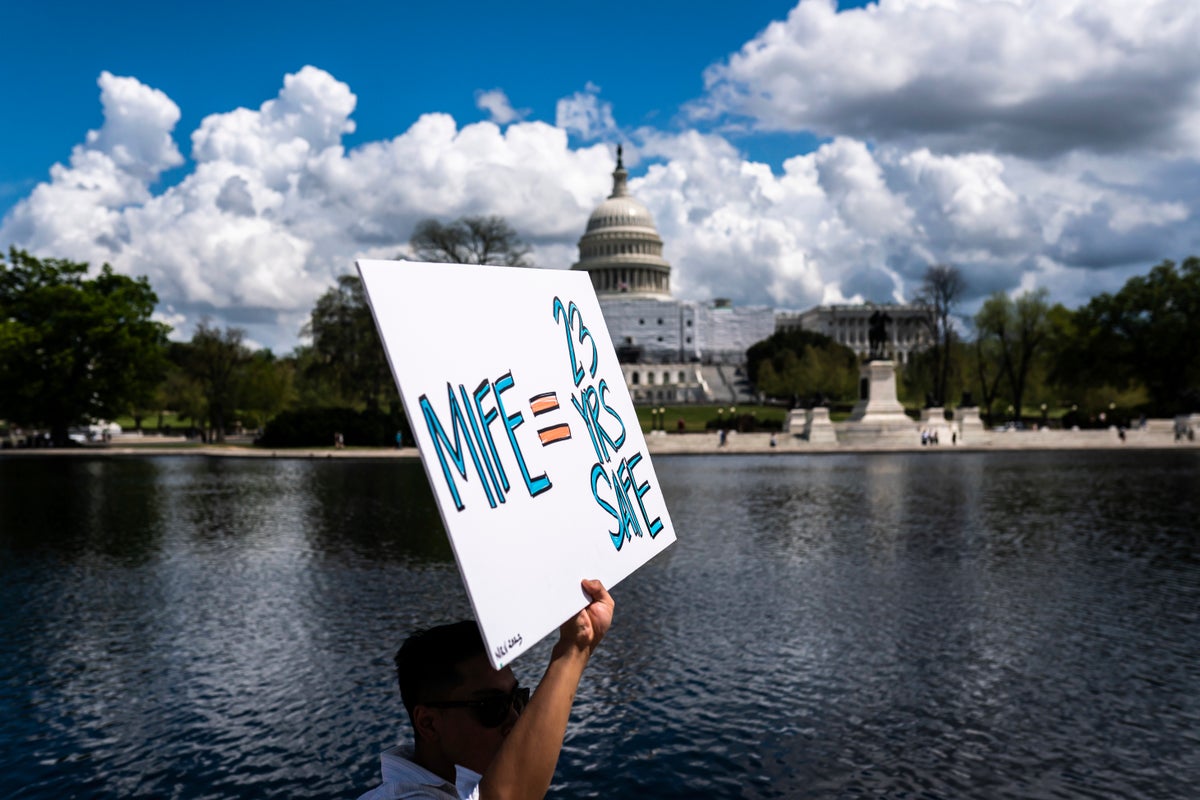
All the legal rulings lately on a key drug used in medication abortions may leave many women wondering: What does this mean for me?
Various courts have recently ruled on mifepristone, which is used in the most common form of abortion in the U.S. On Wednesday, the U.S. Supreme Court temporarily extended access to the pill until Friday while justices consider whether to allow some restrictions to take effect.
Meanwhile, doctors, clinics and telehealth providers are taking steps to ensure they’ll still be able to offer abortion care in the future.
For patients, there’s been confusion “about whether or not they can access their appointments,” said Dr. Becca Simon, a family medicine doctor in Pennsylvania who provides abortions. “We’re trying to just calm people.”
IS THE USUAL TWO-DRUG TREATMENT STILL AVAILABLE?
Yes. People can still get medication abortions using mifepristone from doctors and clinics in states where it was available before the rulings.
Medication abortion, which accounts for more than half of all abortions in the U.S., typically involves two drugs: mifepristone, which blocks progesterone, and misoprostol, which wasn’t affected by the various rulings. The two-drug combination is also used to treat miscarriages.
There are no new restrictions on mifepristone at the moment. But there could be in the future in some states, depending on how the Supreme Court and other courts handle the lawsuits.
Abortion providers have been devising backup plans in case mifepristone is taken off the market or if they face restrictions. That could include switching to a slightly less effective one-drug regimen using only misoprostol.
HOW SAFE IS MIFEPRISTONE?
Doctors and clinic operators worry that the decision earlier this month by a federal judge in Texas blocking the Food and Drug Administration's approval of the medication — and media coverage about it — have led some people to question the drug’s safety.
“The language in the opinion that was used is very, very disturbing,” said Texas OB-GYN Dr. Ghazaleh Moayedi.
Mifepristone, approved by the FDA in 2000, had been used by more than 5.6 million women in the U.S. as of June 2022, according to the agency. Medical groups say complications occur at a lower rate than with routine medical procedures such as wisdom teeth removal and colonoscopies.
In an amicus brief filed in the Texas case, the American College of Obstetricians and Gynecologists, the American Medical Association and other medical organizations said when mifepristone is used as part of the two-drug regimen, serious side effects occur in less than 1% of patients. Major problems such as significant infection or hospitalization occur in less than 0.3% of patients.
“Mifepristone is one of the most studied medications prescribed in the U.S. and has a safety profile comparable to (the over-the-counter pain drug) ibuprofen,” they wrote.
As with any drug, there can be side effects. The most common ones include nausea, weakness, fever, chills and headache. Patients are also told to call their health care providers right away if they have heavy bleeding or abdominal pain.
HOW CAN YOU GET MIFEPRISTONE PILLS FOR AN ABORTION?
From clinics and doctors in places abortions are allowed.
Medication abortions are not available in places where all abortions are banned. Thirteen states effectively ban it at all stages of pregnancy, and one when cardiac activity can be detected. Courts have blocked bans throughout pregnancy in five other states, and one, Georgia, where abortion is forbidden once cardiac activity can be detected.
If abortion is banned in a state, patients seeking one can’t legally get the pills there through telehealth from any state or through the mail, said David Cohen, a Drexel University law professor. They can, however, travel across state lines to visit abortion providers in person or have telehealth appointments from within states where abortion is allowed.
Telehealth rules also vary. Six states that have not banned abortion — Arizona, Indiana, Nebraska, North Carolina, North Dakota and South Carolina — have requirements for at least one trip to the clinic, according to a February report from the Kaiser Family Foundation.
WHAT ABOUT THE ONE-DRUG ABORTION OPTION?
Many abortion providers say they are considering a misoprostol-only protocol if mifepristone becomes unavailable. Medical experts say it’s a safe option, and can also be used to treat miscarriages as well.
But many doctors say it's not ideal. The two-drug combination is about 95% to 99% effective in ending a pregnancy. Used alone, misoprostol is less effective. Some research rates it around 85% effective, although other studies say it’s closer to that of the two-drug combination. Some doctors said misoprostol-only abortions can sometimes be more painful than abortions done with both drugs.
In-office abortion procedures also remain an option.
Given the legal wrangling, Simon, the Pennsylvania doctor, said it’s hard to know what the landscape will look like a few weeks from now.
“We’re still just kind of giving people reassurance to keep checking in with their clinics — which will still have options for them regardless,” she said. ___ The Associated Press Health and Science Department receives support from the Howard Hughes Medical Institute’s Science and Educational Media Group. The AP is solely responsible for all content.







